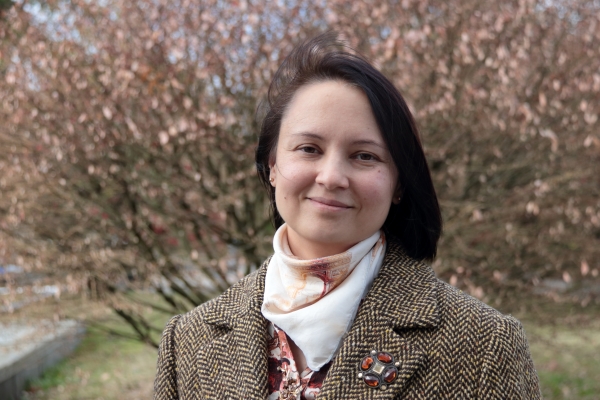 Hanna Rafikova;
Credit: Kangkan Halder
Hanna Rafikova;
Credit: Kangkan Halder
Chronicle.lu recently sat down with Hanna Rafikova, a 43-year-old war refugee from Rubizhne, a city located in Luhansk Oblast in eastern Ukraine, and currently a temporary protection beneficiary in Luxembourg, to discuss her first-hand account of the war in Ukraine, her family's narrow escape through live artillery firing and their new life and challenges in Luxembourg.
Svitlana Keane, a Luxembourg resident, voluntarily translated Hann's story from Ukrainian to English.
Hanna, mother of six children aged three to 21, was employed as an art teacher in Rubizhne and helped her husband, Oleksandr, with the bookkeeping of their family-run businesses (she holds a university diploma in accountancy), which included shops and a solar panel station. Her oldest daughter, Anastasija, 21, lives in Georgia.
On Thursday 24 February 2022, Hanna and her family woke up to the sounds of bombings and the news of war. With her husband and five children, Hanna spent two weeks in their cellar. Hanna's mother, who lived nearby, joined her in the cellar as well. Heavy shelling of a nearby area started on 9 March. That same day, electricity, cellular connection and internet all went off, which meant that the family needed to flee urgently. Hanna recalled that the night was difficult as they packed whatever they could into their two cars. Intense mortar shelling started near their house on 10 March. The family decided to leave in the early morning the next day. However, it was already too late as tanks and other artillery vehicles rolled into their street early in the morning and started shelling the neighbourhood with granades and mortars. Hanna’s house was hit twice with incendiary projectiles, one of which tore through the children’s room. The house caught fire which the family tried to bring under control but it was not possible (below, picture taken from inside the car while fleeing). The fire soon reached the roof when the family had no choice but to escape for their lives – right through live firing from tanks and bullets zipping past them. One shell exploded right next to her family car and Hanna now believes that it was a miracle that the petrol tank and wheels were intact. Apart from shrapnels from the blast damaging the car exterior and breaking its windows, they somehow managed to drive through the firing at around 10:00 on 11 March in two cars. Hanna rescued her two cats as well.
Hanna vividly recalls the help they received during their escape and without which, the family could have been victims of the war. Hanna and her family are indebted to night stays offered in Dinpro by Elena Novikova, by the village council of Voyniliv and especially a resident of the village of Oleg. The family drove through Ukraine in three days to reach Poland.
Soon after Hanna and her family had a narrow escape from Rubizhne, heavy shelling started again and many of the residents on her street were killed. Hanna’s eyes welled up when she recalled that her brother, Andrii, was killed in action while protecting the city on 13 March. Russian forces seized Rubizhne and the nearby town of Voevodivka on 12 May 2022 while the BBC reported that up to 1,500 shells were fired per day during the fight for Rubizhne.
Driving through Poland and Germany, Hanna recalled that they did not stop to seek help as Poland was too close and probably itself in danger while for Germany, the historical memory was strong. The family thought to drive to Belgium but went to Luxembourg first as Hanna knew an old friend there. Unfortunately, her friend herself was trying to get her family out of Ukraine but many new acquaintances appeared and some helped through their deeds, others with kind words and information.
After seven days and over 3,000 kilometres of driving, Hanna and her family members checked into the SHUK (Structure d'hébergement d'urgence au Kirchberg) in Luxembourg-Kirchberg on 17 March, where the shelter provided the family with food and essential goods for two months. Initially, it was difficult to find accommodation for a family of three adults, five children and two cats but the Luxembourg Red Cross has helped to find a flat for the family in Bascharage.
All five children are now enrolled in schools. Both Hanna and Oleksandr are currently learning French and are actively looking for jobs but have been unsuccessful so far due to the language barrier.
Hanna remains unsure about her family’s future and sceptical about going back to her hometown in Rubizhne as all private houses have been destroyed and businesses ruined. There is nowhere left to live or work, recalled Hanna. With her five children and mother to look after, she is worried and hopes that the family will find some stability in terms of jobs and an income.








